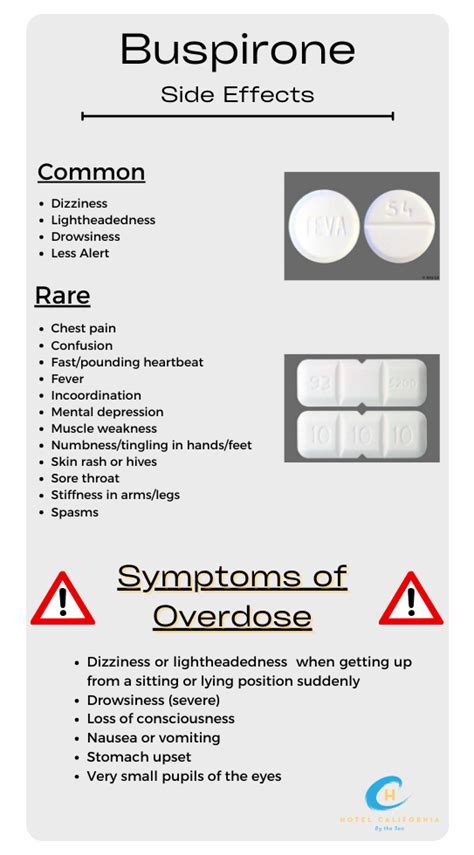Intro
The importance of understanding the potential side effects of any medication cannot be overstated, especially when it comes to medications like buspirone, which is commonly prescribed for anxiety disorders. Buspirone, known by its brand name Buspar among others, is an anxiolytic drug that has been used since the 1980s. Its unique mechanism of action, which is different from typical benzodiazepines, makes it a preferred choice for many patients due to its lower risk of dependency and abuse. However, like all medications, buspirone is not without its side effects. Understanding these side effects is crucial for patients to make informed decisions about their treatment and for healthcare providers to monitor and adjust treatment plans accordingly.
Buspirone works by affecting the brain's chemistry to produce a calming effect. It specifically targets serotonin receptors, which are involved in regulating mood, anxiety, and happiness. While its efficacy in managing anxiety is well-documented, the experience of taking buspirone can vary significantly from person to person. Some individuals may find that the benefits of the medication far outweigh the side effects, while others may experience side effects that are bothersome enough to consider alternative treatments. It's essential for patients to be aware of the potential side effects they might encounter and to discuss any concerns they have with their healthcare provider.
The side effect profile of buspirone is generally considered mild compared to other anxiolytic medications. However, it's crucial to monitor these effects, especially during the initial phases of treatment or when adjusting dosages. Common side effects can include dizziness, nausea, headache, and fatigue. These effects are usually temporary and may diminish as the body adjusts to the medication. Despite the relatively mild nature of these side effects, understanding their causes and how to manage them can significantly improve the treatment experience for individuals taking buspirone.
Introduction to Buspirone Side Effects

Common Buspirone Side Effects
Some of the most common side effects of buspirone include: - Dizziness or lightheadedness: This can be due to the medication's effect on blood pressure and its interaction with the brain's chemical messengers. - Nausea: Stomach upset can occur, especially when first starting the medication or when the dose is increased. - Headache: Headaches are a common side effect, possibly due to the changes in serotonin levels. - Fatigue: Feeling tired or lacking energy can be a side effect, which may improve as the body adjusts to the medication.Less Common but Significant Side Effects

Managing Buspirone Side Effects
Managing side effects often involves a collaborative approach between the patient and healthcare provider. Strategies can include: - Adjusting the dose: Lowering the dose can sometimes alleviate side effects while still providing therapeutic benefits. - Changing the administration time: Taking buspirone with food or at a different time of day can help mitigate side effects like nausea. - Adding supplementary treatments: In some cases, other medications may be prescribed to counteract specific side effects.Severe Buspirone Side Effects

Special Considerations
Certain populations, such as the elderly, pregnant women, and individuals with specific health conditions, may require special consideration when taking buspirone. For example, the elderly may be more susceptible to the sedative effects of buspirone, while pregnant women should discuss the potential risks and benefits with their healthcare provider.Buspirone Interactions

Food and Buspirone
Food can affect the absorption and efficacy of buspirone. Grapefruit and grapefruit juice, in particular, should be avoided as they can increase the levels of buspirone in the blood, potentially leading to increased side effects.Conclusion and Next Steps

Final Thoughts
Buspirone offers a valuable treatment option for anxiety disorders, with a side effect profile that is often more favorable than that of other anxiolytic medications. However, each patient's experience is unique, and what works for one person may not work for another. Through education, awareness, and collaboration with healthcare providers, patients can navigate the potential side effects of buspirone and achieve effective management of their anxiety.What are the most common side effects of buspirone?
+The most common side effects include dizziness, nausea, headache, and fatigue. These are usually mild and temporary.
Can buspirone cause serious side effects?
+Yes, although rare, severe side effects can include allergic reactions, suicidal thoughts, and serotonin syndrome. Immediate medical attention is required if these occur.
How can I minimize the side effects of buspirone?
+Minimizing side effects often involves adjusting the dose, changing the administration time, or adding supplementary treatments. Patients should work closely with their healthcare provider to find the best approach.
We invite you to share your experiences or ask questions about buspirone side effects in the comments below. Your input can help others better understand the potential effects of this medication and how to navigate them effectively. Additionally, if you found this article informative, please consider sharing it with others who might benefit from this information.
